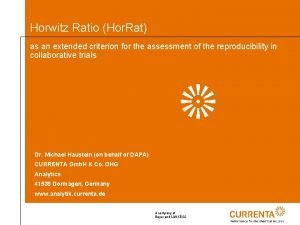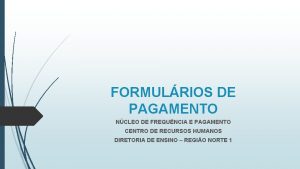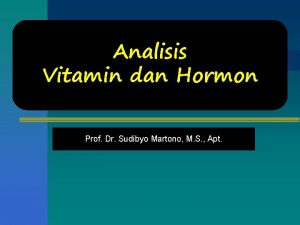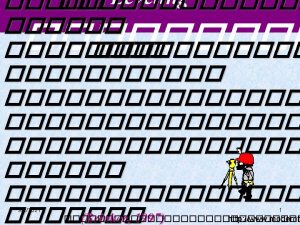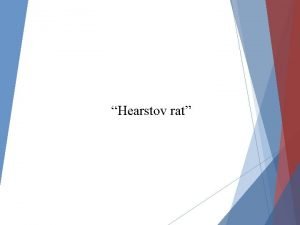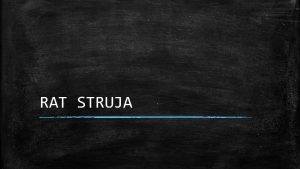Horwitz Ratio Hor Rat as an extended criterion







- Slides: 7

Horwitz Ratio (Hor. Rat) as an extended criterion for the assessment of the reproducibility in collaborative trials Dr. Michael Haustein (on behalf of DAPA) CURRENTA Gmb. H & Co. OHG Analytics 41538 Dormagen, Germany www. analytik. currenta. de A company of Bayer and LANXESS

The Horwitz Equation • In the 1980‘s Horwitz et al. published a relationship between the precision of an analytical method and the concentration of the analyte according to the following equation [1]: • Predicted RSDR = 2 (1 -0. 5 log C) % (empirically set) • With RSDR is the relative standard deviation (= coefficient of variation, CV) under reproducibility conditions (R) C is the concentration of the analyte expressed as a dimensionless mass fraction • Conclusions: • The RSDR appears only to be dependent on the concentration and not on the nature of the analyte, the test material or the analytical test method/technique • The RSDR increases by a factor of two as the concentration of the analyte decreases over two orders of magnitude. So at 100 % concentration of analyte the RSDR is about 2 %, at 1 % it is about 4 % and at 0. 01 % (100 ppm) it is about 8 % ( Horwitz Trumpet) [1] W. Horwitz, L. R. Kamps, K. W. Boyer, J. Assoc. Off. Chem. , 63, 1344 (1980) Dr. M. Haustein (on behalf of DAPA) Horwitz Ratio (Hor. Rat)

The Horwitz Trumpet Dr. M. Haustein (on behalf of DAPA) Horwitz Ratio (Hor. Rat)

Horwitz Ratio (Hor. Rat) • Equation: • with RSDR is the reproducibility obtained from the collaborative trial PRSDR is the predicted reproducibility obtained from the Horwitz equation • Translation: Hor. Rat < 1: RSDR of the method is below the predicted value Hor. Rat = 1: RSDR of the method is equal to the predicted value Hor. Rat > 1: RSDR of the method exceeds the predicted value Dr. M. Haustein (on behalf of DAPA) Horwitz Ratio (Hor. Rat)

Hor. Rat as a benchmark criterion ? • If Hor. Rat is >> 1, the analytical method is undoubtedly suspect to perform worse than expected/hoped (e. g. due to method deficiencies or due to interferences, contaminations or sample inhomegeneity) • If Hor. Rat is << 1, suspect comes out that the collaborative trial was not performed correctly and it gives precision values that are too optimistic (e. g. due to less participants or prior knowledge of analyte content) • If Hor. Rat is close to 1, method precision in terms of reproducibility is close to the predicted value • Which Hor. Rat value/range is suitable as a performance benchmark ? Dr. M. Haustein (on behalf of DAPA) Horwitz Ratio (Hor. Rat)

DAPA proposal/recommendation Hor. Rat value/range 0. 3 ≤ Hor. Rat ≤ 1 Hor. Rat < 0. 3 or 1 < Hor. Rat ≤ 2 Hor. Rat > 2 Dr. M. Haustein (on behalf of DAPA) Horwitz Ratio (Hor. Rat) Remark Fully acceptable Recommended range Acceptable but reasonable explanation required ! Not acceptable

The End……. n o i nt r u o k n a u o y y r fo Th Dr. M. Haustein (on behalf of DAPA) Horwitz Ratio (Hor. Rat) d n i k e t t a
